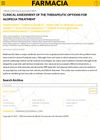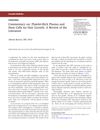November 2022 in “Cureus” New biomaterial treatments for baldness show promise, with options depending on patient needs.
 November 2024 in “Journal of Cosmetic Dermatology”
November 2024 in “Journal of Cosmetic Dermatology” The plant extracts may help treat hair loss by promoting hair growth and reducing DHT levels.
 25 citations,
August 2016 in “Journal of Cosmetic Dermatology”
25 citations,
August 2016 in “Journal of Cosmetic Dermatology” The marine complex supplement significantly improved hair growth in men with thinning hair without adverse effects.
March 2023 in “Anais Brasileiros De Dermatologia” Topical minoxidil is the best-supported treatment for female hair loss, but personalized plans are needed.
 11 citations,
July 2017 in “Expert Opinion on Investigational Drugs”
11 citations,
July 2017 in “Expert Opinion on Investigational Drugs” New hair loss treatments may include topical medications, injections, and improved transplant methods.
 10 citations,
November 2017 in “Dermatologic Clinics”
10 citations,
November 2017 in “Dermatologic Clinics” More men are getting cosmetic procedures, mainly for aging, hair loss, and to keep masculine features, with growing interest in both surgical and noninvasive treatments.
 17 citations,
November 2012 in “Maturitas”
17 citations,
November 2012 in “Maturitas” The conclusion is that proper evaluation and treatment of hair loss in midlife women is important, considering the emotional impact and potential for various treatments.
 48 citations,
April 2013 in “Expert Opinion on Investigational Drugs”
48 citations,
April 2013 in “Expert Opinion on Investigational Drugs” Possible new treatments for common hair loss include drugs, stem cells, and improved transplants.

Using microneedling with PRP improves skin and hair conditions more than microneedling alone.
 69 citations,
February 2002 in “International Journal of Cosmetic Science”
69 citations,
February 2002 in “International Journal of Cosmetic Science” Some hair loss can be treated, especially in women due to nutrition, but some types remain untreatable.
 4 citations,
September 2019 in “Journal of Cosmetic Dermatology”
4 citations,
September 2019 in “Journal of Cosmetic Dermatology” FUE megasession effectively treats severe hair loss with natural-looking results in one operation.
 November 2023 in “Journal of Student Research”
November 2023 in “Journal of Student Research” New treatments like low-level laser therapy, platelet-rich plasma therapy, and micro needling show positive results for hair regrowth in people with genetic hair loss.
 January 2020 in “Der Pharmacia Lettre”
January 2020 in “Der Pharmacia Lettre” Nanoparticle-based herbal remedies could be promising for treating hair loss with fewer side effects and lower cost, but more research is needed.
 5 citations,
February 2022 in “Acta Biomaterialia”
5 citations,
February 2022 in “Acta Biomaterialia” Nanomaterials can improve hair care products and treatments, including hair loss and alopecia, by enhancing stability and safety, and allowing controlled release of compounds, but their safety in cosmetics needs more understanding.
 December 2021 in “Farmacia”
December 2021 in “Farmacia” Different hair loss treatments like topical mixtures, plasma infiltrations, and oral medicine can stop hair loss and improve hair density and follicle size.
 August 2019 in “Aesthetic Surgery Journal”
August 2019 in “Aesthetic Surgery Journal” PRP can boost hair growth and thickness, especially in early stages of hair loss, but its effectiveness varies and there's no set method or treatment frequency. Stem cells also show promise for increasing hair density.
PRP therapy can regrow 30%-40% of lost hair in 3 months without side effects.
 17 citations,
February 2018 in “Journal of Cosmetic and Laser Therapy”
17 citations,
February 2018 in “Journal of Cosmetic and Laser Therapy” The QR 678 hair growth treatment was safe and effective for hair regrowth in men and women.
 19 citations,
May 2021 in “Clinical, Cosmetic and Investigational Dermatology”
19 citations,
May 2021 in “Clinical, Cosmetic and Investigational Dermatology” Minoxidil and finasteride are the best for non-scarring hair loss; more research is needed for scarring hair loss treatments.
 370 citations,
September 1999 in “The New England Journal of Medicine”
370 citations,
September 1999 in “The New England Journal of Medicine” Finasteride and minoxidil are effective for hair loss, but continued research is needed for better treatments.
 4 citations,
February 2021 in “Journal of Cosmetic Dermatology”
4 citations,
February 2021 in “Journal of Cosmetic Dermatology” Pumpkin seed oil slightly outperforms minoxidil foam in treating hair loss with fewer side effects.
14 citations,
August 2020 in “Journal of cosmetic dermatology” Experts recommend using PN-HPT™ for skin rejuvenation in various body areas but have less agreement on initial facial treatment cycles.
 January 2012 in “Elsevier eBooks”
January 2012 in “Elsevier eBooks” Hair loss can cause emotional and social issues, and various treatments, including medication, surgery, and psychological support, are needed.
 36 citations,
October 1996 in “Dermatologic Clinics”
36 citations,
October 1996 in “Dermatologic Clinics” Mice are useful for researching human hair loss and testing treatments, despite some differences between species.
 July 2024 in “Journal of Cosmetic Dermatology”
July 2024 in “Journal of Cosmetic Dermatology” Rose stem cell exosomes can significantly improve hair growth in androgenetic alopecia.
 November 2011 in “Informa Healthcare eBooks”
November 2011 in “Informa Healthcare eBooks” Environmental, chemical, mechanical, and personal health factors can all damage hair and contribute to hair loss or changes in hair quality.
 April 2021 in “JOJ dermatology & cosmetics”
April 2021 in “JOJ dermatology & cosmetics” The combined laser and plasma jet therapy effectively regrew hair in a woman with alopecia areata.
 May 2024 in “Clinical Cosmetic and Investigational Dermatology”
May 2024 in “Clinical Cosmetic and Investigational Dermatology” Manipulating cell cleanup processes could help treat hair loss.
 1 citations,
May 2014 in “Hair transplant forum international”
1 citations,
May 2014 in “Hair transplant forum international” Rogaine can stop hair loss in women, and other treatments like certain pills, light therapy, and special shampoos may also work.
January 2005 in “Farmaceutski glasnik” Minoxidil and finasteride are key treatments for hair loss.
























